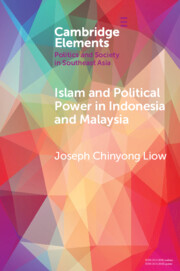1714 results in South-East Asian government, politics and policy
3 - Taiwan’s Unique Position Toward the South China Sea
-
-
- Book:
- Taiwan's Exceptionalism
- Published by:
- Jagiellonian University Press
- Published online:
- 16 July 2022
- Print publication:
- 21 August 2022, pp 31-52
-
- Chapter
- Export citation
Contents
-
- Book:
- Taiwan's Exceptionalism
- Published by:
- Jagiellonian University Press
- Published online:
- 16 July 2022
- Print publication:
- 21 August 2022, pp 5-6
-
- Chapter
- Export citation
9 - Taipei’s Soft Power at Work: The Image of Taiwan in Polish Dailies “Gazeta Wyborcza” and “Rzeczpospolita”
-
-
- Book:
- Taiwan's Exceptionalism
- Published by:
- Jagiellonian University Press
- Published online:
- 16 July 2022
- Print publication:
- 21 August 2022, pp 179-214
-
- Chapter
- Export citation
Contributors
-
- Book:
- Taiwan's Exceptionalism
- Published by:
- Jagiellonian University Press
- Published online:
- 16 July 2022
- Print publication:
- 21 August 2022, pp 215-216
-
- Chapter
- Export citation
Frontmatter
-
- Book:
- Taiwan's Exceptionalism
- Published by:
- Jagiellonian University Press
- Published online:
- 16 July 2022
- Print publication:
- 21 August 2022, pp 1-4
-
- Chapter
- Export citation
Index
-
- Book:
- Taiwan's Exceptionalism
- Published by:
- Jagiellonian University Press
- Published online:
- 16 July 2022
- Print publication:
- 21 August 2022, pp 219-224
-
- Chapter
- Export citation
7 - The Development of Indigenous Tourism Clusters in Taiwan: Economic and Cultural Foundations of Sustainability
-
-
- Book:
- Taiwan's Exceptionalism
- Published by:
- Jagiellonian University Press
- Published online:
- 16 July 2022
- Print publication:
- 21 August 2022, pp 133-162
-
- Chapter
- Export citation
6 - The Sunflower Movement: An Example of the Dynamics of Civic Activity in Taiwan
-
-
- Book:
- Taiwan's Exceptionalism
- Published by:
- Jagiellonian University Press
- Published online:
- 16 July 2022
- Print publication:
- 21 August 2022, pp 117-132
-
- Chapter
- Export citation
4 - Taiwan-China-United States Relations: Taiwan’s Unique Safe House for Better or Worse
-
-
- Book:
- Taiwan's Exceptionalism
- Published by:
- Jagiellonian University Press
- Published online:
- 16 July 2022
- Print publication:
- 21 August 2022, pp 53-78
-
- Chapter
- Export citation
8 - A Shark Paradise in Taiwan (Dis)appears: From Shark Soup to Shark Diving
-
-
- Book:
- Taiwan's Exceptionalism
- Published by:
- Jagiellonian University Press
- Published online:
- 16 July 2022
- Print publication:
- 21 August 2022, pp 163-178
-
- Chapter
- Export citation

Islam and Political Power in Indonesia and Malaysia
- The Role of Tarbiyah and Dakwah in the Evolution of Islamism
-
- Published online:
- 15 August 2022
- Print publication:
- 25 August 2022
-
- Element
- Export citation
Copyright page
-
- Book:
- Mobilizing for Elections
- Published online:
- 04 August 2022
- Print publication:
- 11 August 2022, pp iv-iv
-
- Chapter
- Export citation
Index
-
- Book:
- Mobilizing for Elections
- Published online:
- 04 August 2022
- Print publication:
- 11 August 2022, pp 297-312
-
- Chapter
- Export citation
Tables
-
- Book:
- Mobilizing for Elections
- Published online:
- 04 August 2022
- Print publication:
- 11 August 2022, pp vii-vii
-
- Chapter
- Export citation
Figures
-
- Book:
- Mobilizing for Elections
- Published online:
- 04 August 2022
- Print publication:
- 11 August 2022, pp vi-vi
-
- Chapter
- Export citation
Bibliography
-
- Book:
- Mobilizing for Elections
- Published online:
- 04 August 2022
- Print publication:
- 11 August 2022, pp 273-296
-
- Chapter
- Export citation
Contents
-
- Book:
- Mobilizing for Elections
- Published online:
- 04 August 2022
- Print publication:
- 11 August 2022, pp v-v
-
- Chapter
- Export citation
9 - Conclusion
-
- Book:
- Mobilizing for Elections
- Published online:
- 04 August 2022
- Print publication:
- 11 August 2022, pp 235-256
-
- Chapter
- Export citation
6 - Hijacked Programs
-
- Book:
- Mobilizing for Elections
- Published online:
- 04 August 2022
- Print publication:
- 11 August 2022, pp 150-175
-
- Chapter
- Export citation
4 - Targeting Individuals: Don’t You Forget about Me
-
- Book:
- Mobilizing for Elections
- Published online:
- 04 August 2022
- Print publication:
- 11 August 2022, pp 99-124
-
- Chapter
- Export citation

